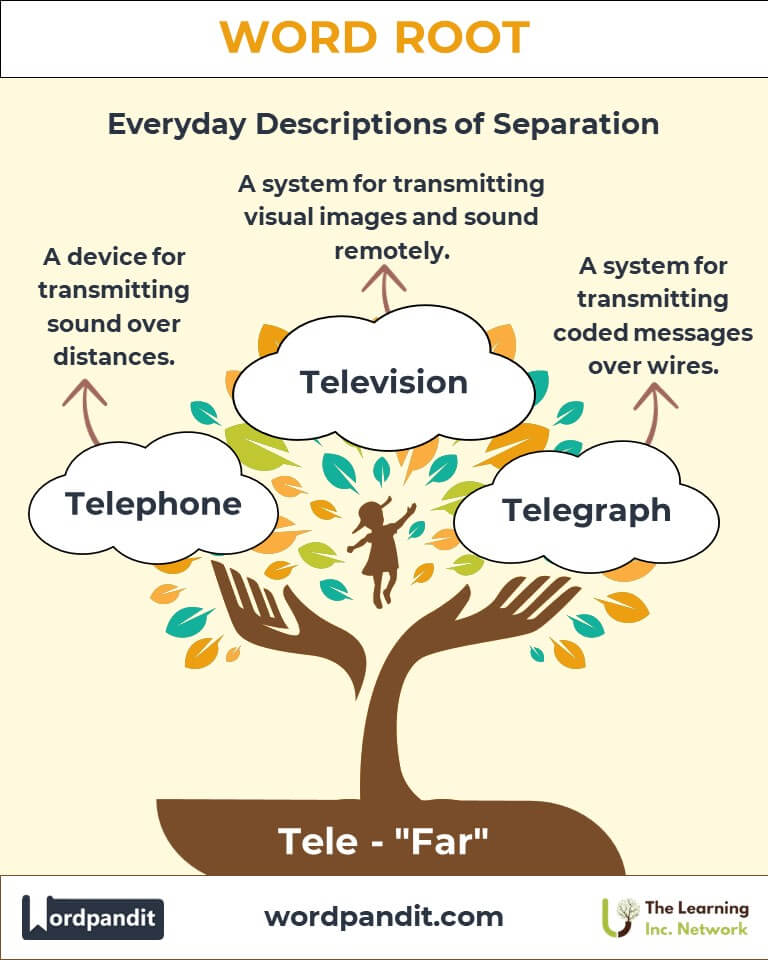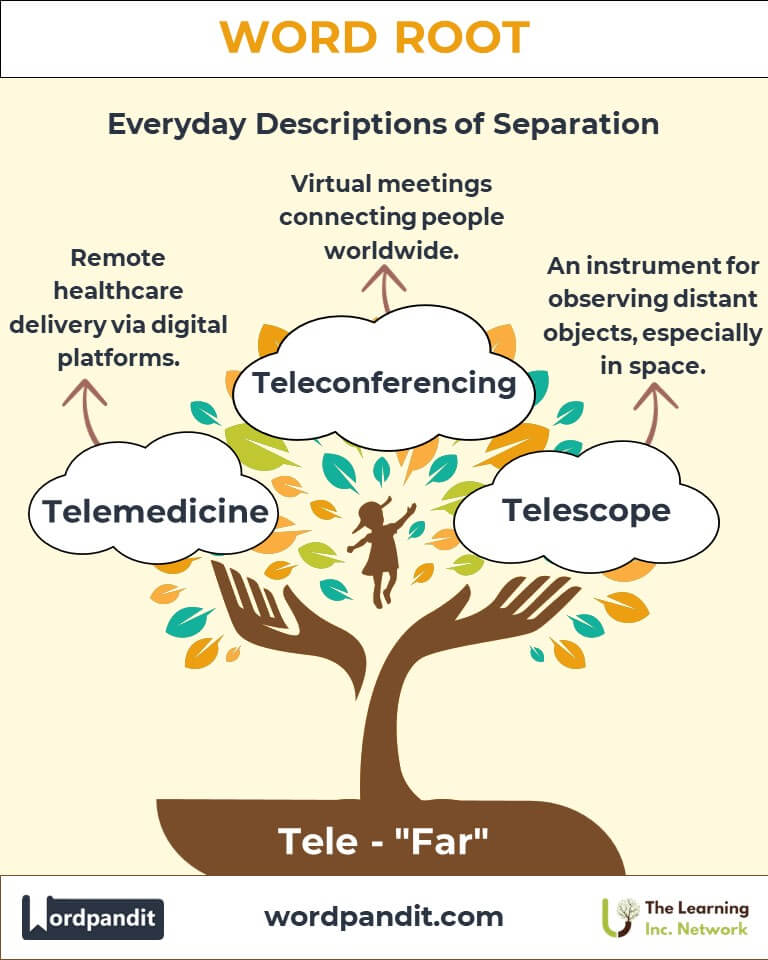Tele: Exploring the Reach of the "Far" Root in Communication and Beyond
Byline: Uncover the fascinating journey of "Tele," a root word derived from Greek, meaning "far." From the advent of the telephone to the marvels of the telescope, "Tele" has bridged distances, revolutionized communication, and expanded humanity's horizons.

Table of Contents
- Introduction: The Essence of "Tele"
- Etymology and Historical Journey
- Mnemonic: Unlocking the Power of "Tele"
- Common "Tele"-Related Terms
- "Tele" Through Time
- "Tele" in Specialized Fields
- Illustrative Story: "Tele" in Action
- Cultural Significance of the "Tele" Root
- The "Tele" Family Tree
- FAQs About the "Tele" Word Root
- Test Your Knowledge: "Tele" Word Root Quiz
- Conclusion: The Boundless Legacy of "Tele"
1. Introduction: The Essence of "Tele"
Imagine a world where vast distances could vanish with the press of a button or the turn of a lens. The root "Tele," pronounced teh-leh, originates from Greek, meaning "far." It embodies our enduring quest to connect across space. From the groundbreaking invention of the telephone to the discovery of celestial wonders via telescopes, "Tele" represents the bridging of gaps, both literal and metaphorical.

2. Etymology and Historical Journey
The root "Tele" traces its origins to the ancient Greek word τῆλε (tēle), meaning "far" or "distant." It first emerged in classical literature, describing geographic distances. With the technological advancements of the 19th and 20th centuries, "Tele" gained new life, becoming a cornerstone in terms such as "telegraph" and "television." These inventions redefined human communication and access to information.
3. Mnemonic: Unlocking the Power of "Tele"
To remember "Tele," envision a string connecting two tin cans over a great distance—a child’s playful demonstration of communication across space.
Mnemonic Device: "Tele takes you far, from telephone calls to telescopic stars."
4. Common "Tele"-Related Terms
- Telephone (tel-uh-fohn):
- Definition: A device for transmitting sound over distances.
- Example: "The telephone revolutionized long-distance communication."
- Telescope (tel-uh-skohp):
- Definition: An instrument for observing distant objects, especially in space.
- Example: "Through the telescope, they marveled at the rings of Saturn."
- Television (tel-uh-vizh-uhn):
- Definition: A system for transmitting visual images and sound remotely.
- Example: "The television broadcast the moon landing live to millions."
- Telegraph (tel-uh-graf):
- Definition: A system for transmitting coded messages over wires.
- Example: "The telegraph was a vital tool during wartime."
- Teleport (tel-uh-port):
- Definition: To instantly transport across distances (fictional).
- Example: "In sci-fi, characters often teleport to distant planets."
5. "Tele" Through Time
- 19th Century: The telegraph made real-time communication over vast distances possible, marking a pivotal moment in global connectivity.
- 20th Century: The television brought images from across the world into homes, forever altering media consumption.
- 21st Century: Telescopes, like the James Webb Space Telescope, offer humanity unprecedented glimpses into the cosmos.
6. "Tele" in Specialized Fields
- Astronomy:
- Telescope: Essential for studying celestial bodies and expanding our knowledge of the universe.
- Medicine:
- Telemedicine: Remote healthcare delivery via digital platforms, especially crucial in underserved areas.
- Telecommunications:
- Teleconferencing: Virtual meetings connecting people worldwide, integral to modern business and education.
- Education:
- Telelearning: Online education platforms that bridge geographic and economic divides.
7. Illustrative Story: "Tele" in Action
Sophia, a young scientist, used her telescope to observe a distant comet. Inspired by the view, she called her mentor on the telephone to share her findings. Meanwhile, her brother joined a teleconference to discuss innovations in telemedicine. Despite being miles apart, their shared use of "Tele" technologies brought them closer in purpose and spirit.
8. Cultural Significance of the "Tele" Root
From the telegraph's role in uniting continents to the telescope's ability to inspire awe, "Tele" has profoundly shaped human culture. It symbolizes the ingenuity and desire to overcome physical limitations, fostering global connectivity and understanding.

9. The "Tele" Family Tree
- Auto- (self):
- Autotelephone: A system for self-operating calls.
- Graph- (write):
- Telegraph: Writing transmitted over distances.
- Vision- (sight):
- Television: Transmitting visual images remotely.
- Scope- (view):
- Telescope: Viewing faraway objects.
- Microscope: Viewing tiny objects.

10. FAQs About " Tele "
Q: What does "Tele" mean?
A: The root "Tele" means "far" or "distant." It is derived from the Greek word τῆλε (tēle). This root forms the basis of numerous terms related to communication, observation, and connection across distances, such as "telephone" (sound transmitted far) and "telescope" (viewing far).
Q: What is a telephone?
A: A telephone is a device that transmits sound, particularly speech, over distances. It revolutionized communication by allowing real-time conversation between people located far apart. Its invention in the late 19th century by Alexander Graham Bell marked the beginning of modern telecommunications.
Q: What’s the difference between a telescope and a microscope?
A: A telescope is designed to observe distant objects, like stars and planets, using lenses or mirrors to magnify them. A microscope, on the other hand, magnifies extremely small objects, like cells or bacteria, enabling us to see details not visible to the naked eye. Both terms share the suffix "-scope," meaning "view."
Q: What is telemedicine?
A: Telemedicine involves the use of telecommunications technology to deliver healthcare services remotely. For example, a doctor might diagnose and treat patients through video calls, which is particularly valuable in rural or underserved areas where access to medical professionals is limited.
Q: Why is "Tele" significant in communication?
A: "Tele" represents the concept of connecting people across distances. Innovations like the telegraph, telephone, and television have transformed how we share information and ideas, making it possible to overcome physical separation in real-time.
11. Test Your Knowledge: " Tele " Mastery Quiz
1. What does the root "Tele" signify?
2. What device observes distant objects in space?
3. Which term refers to visual transmission over distances?
4. What does telemedicine involve?
5. What was the first "Tele" device for communication?
12. Conclusion: The Boundless Legacy of "Tele"
The root "Tele" exemplifies humanity's relentless drive to connect and explore. From ancient Greek origins to modern technological marvels, it continues to inspire and enable global communication and discovery. As innovation advances, the influence of "Tele" will undoubtedly grow, reminding us of the power of bridging distances. Let "Tele" motivate you to reach for new horizons, no matter how far.














